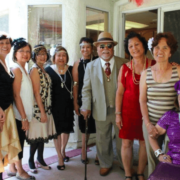THOSE that can, do; those that can’t teach…well, that is so insulting. Teaching is the most exalted position — that prestige will always be there. Teachers bring some kind of coherence into a relationship with disciplinary modes, so students can think and explore ideas as they evolve and take shape and consider what might have happened.
The school is often described as a “gathering of gifts.” Everyone from the teacher, the administrator, the principal, and the student brings a gift to that classroom and school, like a sharing of gifts. The teacher manages but requires extraordinary courage, nurturance, attention, energy, commitment and empathy.
In a sense of orchestration, only a teacher can deliver the child; on the other hand, the student does not come to school as an empty vessel, because he or she brings quite a full history, preoccupations, dreams, hopes and concerns. Then just as the teacher comes with his or her own set of those, they are negotiated every day throughout the year, and changed over time in a rush diversity.
On a recent Sunday in Simi Valley, I was invited to a tiny reunion by a group of Batch ‘66 – Philippine Normal University teachers, who gathered from corners of the world — the US, Canada, Japan, and more. It was a dubbed a Great Gatsby Red Carpet Affair, in the home of their overall coordinator Cely Anuran.
It was a day of learning for each of the teachers. In a sparkling conversation that set on nothing but their world, they came up with quotable tidbits. Indeed, a sharing of minds.
I. Encouraging children to recognize that they have something to give to school.
II. They need to be praised for individual expression, for the way that they are different from others and not always praised for the way that they are like others.
III. If they do something well, they want praise for it.
IV. Good teachers teach kids about being emphatic, and help them be aware that the group life in school is different from home life as from plays and life outside.
They had exchanges and came up with contentions like, good teachers come in all forms and express themselves very differently. What they have in common is that they regard themselves as thinkers — all existing in the world of ideas, whether you’re a nursery teacher or a university professor. The currency is an idea, as conveyed through relationships because the teacher not only has knowledge as a thinker, but he or she must communicate it.
The teachers’ collective regret is that they now have entered a phase in our society where educators are more involved for what it will return, rather than what it will make out of them.
What makes certain schools good and some teachers memorable is not teaching as an art, or maybe just a craft. It is the interplay of discipline and humor as they manage most of the time to do what is not hoped for, but expected: extraordinary courage, nurturance, attention, energy, commitment, empathy and the sense of orchestration. Call it a craft, skill or gift.
But it is appreciation, respect and dignity, more than the rewards. We all have to develop a more realistic view of the roles that teachers play in everyone’s lives.







